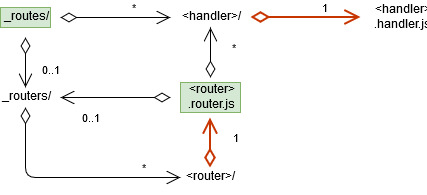PERMA-DATA
first release to come: 0.5.2

PERMA-DATA is a plant database, a collaborative tool, a game and a rich creative universe.
Table of contents
What is PERMA-DATA ?
PERMA-DATA is being developped to agregate [plant data] from various but consistent sources.
Its main concern is to make this data available for everybody, while ensuring its quality and maintainability.
The principles stated below define some key objectives.
Principles
-
Gather and abstract plant data Extract [plant data] from various supports and store it as atomic and interoperable value.
-
Shapes plant data for user From this raw and numerous atomic [plant data] (principle 1), build a user-friendly interface to display consistent data views.
-
Continuous improvement The application will never stop improving in term of reliability and features.
-
Maintainable infrastructure Development and hosting aims for the lowest energetic and financial costs.
-
Minimalist features and workflows To enforces its low consumption orientation (principle 3) and save user time and attention, application remains as simple as possible.
-
Playing is learning As part of shaping data (principle 6), a gamification layer has been added to make and the learning more playful and the data crawling more interesting.
-
A fantastic universe The story of the PERMA-DATA game (principle 5) takes place between a near future and up to the end of universe : an ideal setup for imaginating tomorrow's solutions.
-
Art for the soul Illustrating this very universe (principle 6), creativity and aesthetics are also a support for sharing knowledge better.
-
A philosophical tale Universe (principle 6) and art (principle 7) seres as an image/metaphor of way more abstract concepts.
-
A tool for research Sourced and verfied [plant data], that you can contribute to enlarge by your work (principle 11).
-
A tool for gardening Inventory your genetics, manage plants in your garden, get tips and send feedback (principle 11).
-
A tool for communities Gardening (principle 10) is also sharing. We are giving a pleasant interface to chat and visualize tasks for your gardener crew.
-
Collaborative development The application is open-source, ready for user and developer interactions.
-
Implementation of shared patterns Patterns are defined not to obfuscate architecture but to define a common language, easing design exchanges and code refactoring.
Development
PERMA-DATA is built on a composite stack :
-
Server :
node+expresspugjstemplate enginemongodatabase
-
Client :
jquery+react[bundles]reduxstate management
The design promotes use of code patterns to enforce a scallable architecture. Please refer to the dedicated section of this document to learn more.
Quick start
Installation
- First of all, install dependencies with
npm install. - You may also need to install
webpackglobally.
You'll have then to request @Skaant to obtain mongo credentials to provision the server/mongo/clientSecret.json file with username and password :
{
"username": "",
"password": ""
}Local server
- Start the server with
npm run dev-start, npm startis reserved for production.
Client bundles
Every client bundle has its own npm run command :
{
"build-home-base": "webpack --config ./webpack.config.js --output ./public/bundles/pages/home/base.js ./src/bundles/entrypoints/pages/home/base/base.js",
"build-home-auth": "webpack --config ./webpack.config.js --output ./public/bundles/pages/home/auth.js ./src/bundles/entrypoints/pages/home/auth/auth.js",
"build-plantId-main": "webpack --config ./webpack.config.js --output ./public/bundles/pages/plantId/main.js ./src/bundles/entrypoints/pages/plantId/main.js",
"build-plantId-auth": "webpack --config ./webpack.config.js --output ./public/bundles/pages/plantId/auth.js ./src/bundles/entrypoints/pages/plantId/auth.js"
}Patterns
*Section automatically generated**
-
global
-
server
-
client
- _data
_aggregation
- _data
mongo aggregation query
Type : PATTERN_TYPE_SERVER
Describes a mongo aggregation query as a composition of a mongo aggregation stages pipeline.
Describes a facet-specific mongo aggregation query as a multiple paralleled mongo aggregation stages pipelines.
Instances : ./server/app (...) /.aggregation.js/
_chains
handler chained processes
Type : PATTERN_TYPE_SERVER
Describes chains of promises (chain links) of types : _controllers, _dbcalls and _switches.
Occurence: In an .handler file, to order the process of answering request.
Standardizes the server lifecycle, after the middlewares, from the handler, up to the response send method.
Problem: Handlers can result in a long suit of instructions, difficult to read and to maintain.
Solution: Create an array of standard operations (_controllers, _dbcalls), meant to be conditionnally (_switches) executed to prepare the response's body.
Implementation: Composition of [_chainLinks].
Instances : ./server/app (...) /.chain.js/
- ./server/app/_routes/_routers/api/_routers/auth/signUp/_chains/_main/signUp.main.chain.js
_data
hard coded data
Type : PATTERN_TYPE_CLIENT
Stores static data to be bundled.
Occurence: A component, or a logic, start consuming data which must be configurable for the future.
Problem: Data and logic should be separed.
Solution: Use a _data folder and fill .json or .js files with data to be extracted.
Implementation: In the consumer folder (or higher for multiple consumers), create the _data folder and some .json files to store data. .js files should be only used when storing functions.
Instances : ./src (...) /_data/
- ./src/_patterns/_data
- ./src/_dep_data
- ./src/bundles/modules/city/_components/City/_data
- ./src/bundles/modules/city/_components/City/BuildingList/buildings/_data
_enum
enumeration
Type : PATTERN_TYPE_GLOBAL
Define a set of shared values.
Occurence: two or more modules will have to communicate on the same values.
Problem: the values must be from the same referencial.
Solution: define a module exposing a set of values.
Implementation: the shared values module must be located in a dedicated _enums folder.
Folder should be at the top of the consumers' common folder tree.
Instances : . (...) /.enum.js/
- ./_patterns/_pattern/_enums/patternType/patternType.enum.js
- ./_patterns/_pattern/_enums/patternRelation/patternRelation.enum.js
_middlewares
middlewares folder and files
Type : PATTERN_TYPE_SERVER
Describes middleware functions and their unique folder.
Occurence: a new middleware has to be developped/integrated.
Problem 1: Where to put this new middleware ?
Problem 2: How to enforce a common interface for middleware files ?
Solution 1: Group all the middlewares used by the server app in the same folder.
Solution 2: Define a middleware file format.
Implementation 1:
The server/app/folder figures the dedicated folder for all middlewares.
Test : the .middleware files location.
_middlewaresfolder tree pattern
_middlewares
+-- <middleware>
| +-- <middleware>.middleware.jsImplementation 2:
all the .middleware module file expose a factory which return a middleware handler.
Test : the .middleware file format.
.middlewarefile code pattern
module.exports =
() =>
(req, res, next) => {
// the middleware logic here ...
next()
}Instances : ./server/app (...) /.middleware.js/
- ./server/app/_middlewares/log/log.middleware.js
- ./server/app/_middlewares/auth/auth.middleware.js
_pattern
code patterns
Type : PATTERN_TYPE_GLOBAL
Describes a code pattern which can be reproduced across the project.
Patterns enforce logic, files and tests standardization.
These are project's keystones.
Occurence 1: Whenever a logic is shared across the code, we have two choices :
_utilsexposes a single function called from different sub-folders,_pattern, while more strict in syntax, exposes a whole framework to manage :- iterations, the basic of a pattern is the repetition of the same logic,
- processor, is what digest iteration and can be either a module or simply a way for code to call it,
- generality, extending
_utils,_patternallow its iterations to hold their own logic, which means that they can be activated is certain conditions, - folder organization,
- tests, for iterations and processor.
Problem:
The same way _utils does it, _pattern implements the DRY principle.
At some point a logic is repeted but it also requires a higher generality for its iterations to be specialized.
Solution 1: A standard *.pattern.js file is specified at the top root of folders shared tree which describes the logic for humans and digesters (documentor and tests).
Instances : . (...) /.pattern.js/
- ./_patterns/_utils/_utils.pattern.js
- ./_patterns/_pattern/_pattern.pattern.js
- ./_patterns/_enum/_enum.pattern.js
- ./src/_patterns/_data/_data.pattern.js
- ./server/app/_patterns/_routes/_routes.pattern.js
- ./server/app/_patterns/_middlewares/_middlewares.pattern.js
- ./server/app/_patterns/_chains/_chains.pattern.js
- ./server/app/_patterns/_aggregation/_aggregation.pattern.js
_routes
server routes tree
Type : PATTERN_TYPE_SERVER
Describes a recursive route and router files tree.
Occurence: a new route has to be developped.
Problem 1: 1. Where to put this new route to keep a file tree as close as the route tree ?
Problem 2: 2. How to enforce a common interface for route (and router) files ?
Solution 1: 1. Define routes tree as stated :
- Folders and [router] files as path nodes,
- Route files as [route] endpoints,
- The root [router] is
_routes.
Solution 2: 2. Define [router] and [route] file format.
Solution 3:

Implementation 1: contains all server's routes, ordered through :
- Multiple [handler]s at the
<router>/folder root, - Multiple [router]s in an optional
_routers/folder, also at the<router>/folder root, - A
.routerfile to bind handlers and routers, down to this recursive structure.
Tests :
_routes/location,<handler>/1..1<handler>.handler.jscomposition,<router>/:- 1..1
<router>.router.js, - 0..*
<handler>/, - 0..1
_routers/1..*<router>/composition
- 1..1
_routes/folder tree pattern
_routes
+-- _routers
| +-- <router>
| | +-- <router>.router.js
| | +-- _routers // _routers recursion ...
| | +-- <handlerB>
| | | +-- <handlerB>.handler.js
+-- <handlerA>
| +-- <handlerA>.handler.js
+-- _routes.router.jsImplementation 2:
a .router file exposes an express.Router() which :
router.use(path, <router>), to bind sub-routers to path,router.<method>(path, <handler>)to bind handlers to method and path.
Test : the .router file format.
.routerfile code pattern
const { Router } = require('express')
const router = Router()
router
.use(
'<path>',
require('./_routers/<router>/<router>.router')
)
router
.put(
'/<path>',
require('./<handler>/<handler>.handler')
)
module.exports = routerImplementation 3:
a .handler file exposes a handler signature and return the express.res (can be encapsulated in a Promise).
Test : the .handler file format.
.handlerfile code pattern
module.exports =
(req, res) => {
// the handler logic here ...
return res
.send()
// or other method
}Instances : ./server/app (...) /.handler.js/
- ./server/app/_routes/_routers/api/_routers/auth/signUp/signUp.handler.js
- ./server/app/_routes/_routers/api/_routers/auth/signIn/signIn.handler.js
- ./server/app/_routes/_routers/api/_routers/auth/recoverPassword/recoverPassword.handler.js
- ./server/app/_routes/_routers/api/_routers/auth/checkToken/checkToken.handler.js
- ./server/app/_routes/_routers/api/plantSearch/plantSearch.handler.js
- ./server/app/_routes/_routers/api/actions/actions.handler.js
- ./server/app/_routes/plantId/plantId.handler.js
- ./server/app/_routes/home/home.handler.js
_utils
utilities folder
Type : PATTERN_TYPE_GLOBAL
Define a shared logic folder.
Occurence: two or more modules use the same logic.
Problem: as the DRY principle states it, we should find a way to share the logic code between this two consumers.
This pattern adresses more the shared logic location, than the abstraction concept itself, which is more relevant to _pattern.
Solution: put the logic at the top of the consumers common path.
Implementation: the logic code folder has to be located in a dedicated _utils/ folder.
Folder should be at the top of the consumers' common folder tree.
Folder tree pattern :
childrens consume thesharedLogics service.
<parent>
+-- _utils
| +-- sharedLogic
| | +-- sharedLogic.js
+-- <childrenA>
| +-- <childrenA>.js
+-- <childrenB>
| +-- <childrenB>.jsInstances : . (...) /_utils/
- ./_utils
- ./_patterns/_utils
- ./src/bundles/modules/_utils
- ./src/bundles/modules/search/_components/_utils
- ./src/bundles/modules/main/_reducer/notifications/_utils
- ./server/app/_utils
- ./server/app/_routes/_routers/api/_utils
- ./server/app/_routes/_routers/api/_routers/auth/_utils
API
All API routes are prefixed with /api/.
/auth/{ mode }
Where mode = { 'sign-in', 'sign-up', 'recover-password' }.
Returns
Un objet de type user.
Objects
user
{
"pseudo": "<string>",
"buildings": "<array of [building]>"
}building
dialogs
dialog:quest
dialog:story
Glossary
- pattern
- instances
- plant data